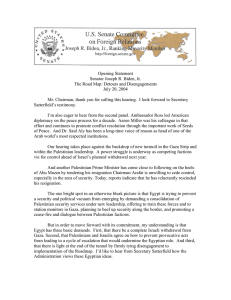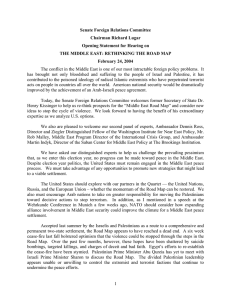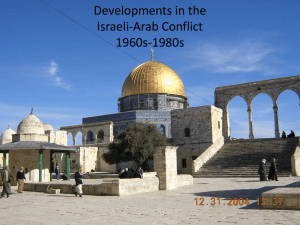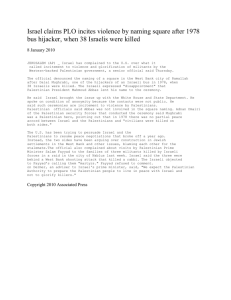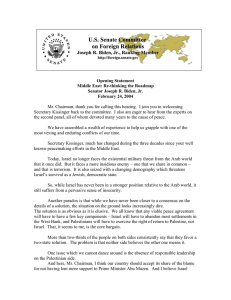Document 11743289
advertisement
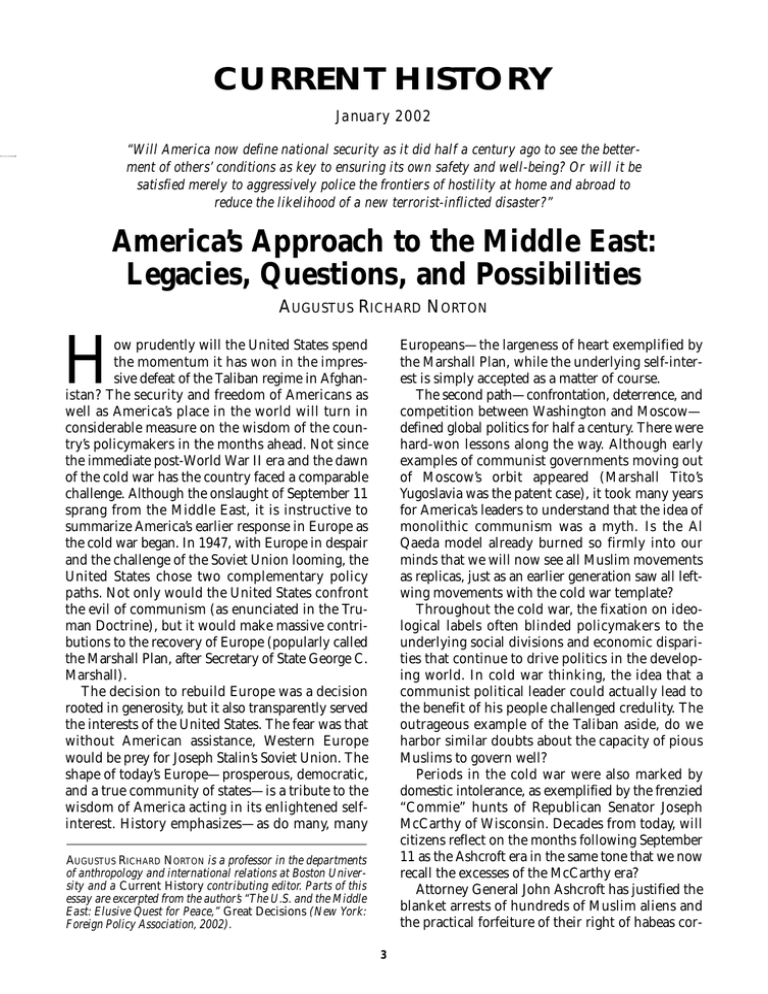
CURRENT HISTORY January 2002 “Will America now define national security as it did half a century ago to see the betterment of others’ conditions as key to ensuring its own safety and well-being? Or will it be satisfied merely to aggressively police the frontiers of hostility at home and abroad to reduce the likelihood of a new terrorist-inflicted disaster?” America’s Approach to the Middle East: Legacies, Questions, and Possibilities AUGUSTUS RICHARD NORTON H Europeans—the largeness of heart exemplified by the Marshall Plan, while the underlying self-interest is simply accepted as a matter of course. The second path—confrontation, deterrence, and competition between Washington and Moscow— defined global politics for half a century. There were hard-won lessons along the way. Although early examples of communist governments moving out of Moscow’s orbit appeared (Marshall Tito’s Yugoslavia was the patent case), it took many years for America’s leaders to understand that the idea of monolithic communism was a myth. Is the Al Qaeda model already burned so firmly into our minds that we will now see all Muslim movements as replicas, just as an earlier generation saw all leftwing movements with the cold war template? Throughout the cold war, the fixation on ideological labels often blinded policymakers to the underlying social divisions and economic disparities that continue to drive politics in the developing world. In cold war thinking, the idea that a communist political leader could actually lead to the benefit of his people challenged credulity. The outrageous example of the Taliban aside, do we harbor similar doubts about the capacity of pious Muslims to govern well? Periods in the cold war were also marked by domestic intolerance, as exemplified by the frenzied “Commie” hunts of Republican Senator Joseph McCarthy of Wisconsin. Decades from today, will citizens reflect on the months following September 11 as the Ashcroft era in the same tone that we now recall the excesses of the McCarthy era? Attorney General John Ashcroft has justified the blanket arrests of hundreds of Muslim aliens and the practical forfeiture of their right of habeas cor- ow prudently will the United States spend the momentum it has won in the impressive defeat of the Taliban regime in Afghanistan? The security and freedom of Americans as well as America’s place in the world will turn in considerable measure on the wisdom of the country’s policymakers in the months ahead. Not since the immediate post-World War II era and the dawn of the cold war has the country faced a comparable challenge. Although the onslaught of September 11 sprang from the Middle East, it is instructive to summarize America’s earlier response in Europe as the cold war began. In 1947, with Europe in despair and the challenge of the Soviet Union looming, the United States chose two complementary policy paths. Not only would the United States confront the evil of communism (as enunciated in the Truman Doctrine), but it would make massive contributions to the recovery of Europe (popularly called the Marshall Plan, after Secretary of State George C. Marshall). The decision to rebuild Europe was a decision rooted in generosity, but it also transparently served the interests of the United States. The fear was that without American assistance, Western Europe would be prey for Joseph Stalin’s Soviet Union. The shape of today’s Europe—prosperous, democratic, and a true community of states—is a tribute to the wisdom of America acting in its enlightened selfinterest. History emphasizes—as do many, many AUGUSTUS RICHARD NORTON is a professor in the departments of anthropology and international relations at Boston University and a Current History contributing editor. Parts of this essay are excerpted from the author’s “The U.S. and the Middle East: Elusive Quest for Peace,” Great Decisions (New York: Foreign Policy Association, 2002). 3 4 • CURRENT HISTORY • January 2002 ing the constituency of approval that terrorists pus by the exigencies of national security in a enjoy? moment of extraordinary danger. A similar argument is used to promote the use of military tribunals for Al Qaeda terrorists rather than the civil SOURCES OF ANGER court system, which was used to successfully prosSkepticism about American policy in the Muslim ecute the perpetrators of the first World Trade Cenworld had been brewing throughout the 1990s and ter bombing of 1993. Unlike military courts martial, culminated after the September maelstrom. Ameriwhich preserve most constitutional protections, the cans were justifiably appalled, even embittered, at tribunals would bear a closer resemblance to the images of young Palestinian refugees greeting news closed and arbitrary security courts that the United of the disaster with delight and celebration. Were States has criticized in Egypt and Peru, among other the wellsprings for the celebrants’ bile a deep-rooted places. Each of these measures enjoys wide public religious or ideological hatred of America? If so, the support, but that may only emphasize that the wisfuture of America’s relationship with the Muslim dom of the Constitution is to protect minority world—which is inhabited by more than 1 billion rights even in the face of majority opinion. people—may be dark and violent. There is no doubt Law enforcement’s scrutiny of Muslims in Amerthat hatred has been inculcated in some Muslim ica highlights the lurking danger that the war against quarters, particularly in fundamentalist schools and terrorism will be viewed by Americans and Muslims seminaries where many young Muslims are exposed as a war against Muslims. The idea of a clash of civto a puritanical, xenophobic, and uncompromising ilizations between Islam and the West is popular interpretation of Islam. These institutions have prowith Muslim extremists. Osama bin Laden struck liferated in recent decades, not least in Pakistan. this chord in his October 7 rejoinder to the bombing The larger real challenge is how to dissipate the campaign in Afghanistan. Condoleezza Rice, the anger that is so widely expressed by mainstream national security adviser, urged television network Muslims. In some cases the intrusion of Western executives later in cultural values spawns October to exercise resentment, but there critical judgment in The United States is often resented for propping up is often a tendency to airing such broad- unpopular and corrupt regimes rather than prodding exaggerate this factor. casts. She argued that Many Muslims are them to change their ways. bin Laden might use fascinated with Westthese forums to relay ern media, music, secret messages, but, given the vagaries of translaand film, not to mention technology. tion (and several network translations were truly More important, anger is certainly a by-product of atrocious), this seems implausible. The larger conthe frustration that grips many Muslim societies, cern in the administration was that Osama’s message where one’s life chances are stymied by rigid politirang true to many of his Muslim listeners (who, in cal systems and stale economies that resist reform. any case, could gain easy access to the Arabic text The United States is often resented for propping up through the Internet). unpopular and corrupt regimes rather than prodding Will America now define national security as it them to change their ways. Despite considerable did half a century ago to see the betterment of othWashington rhetoric about promoting democracy in ers’ conditions as key to ensuring its own safety and the world, American policymakers have preferred well-being? Or will it be satisfied merely to aggresassured stability to the promotion of freedom and sively police the frontiers of hostility at home and reform in the Middle East. Given the popularity of abroad to reduce the likelihood of a new terroristoppositional Islamist movements that are vocal in inflicted disaster? The lesson of 1947 would be to their criticism of the United States and often hostile do both, but it is not yet clear if that will be the to the survival of Israel, policymakers view the prochosen path. The policy debate in Washington motion of free elections and widespread political parreflects wide disagreement. Whether Muslim comticipation as tantamount to courting disaster. plaints about United States foreign policy are The risk of self-fulfilling prophecy is obvious: merely symptoms of embedded hostility and disexcluded opposition groups, whether Islamists or placed frustration or reflect concerns to which secular, conclude that peaceful change is not possiAmerica should respond is central to the debate. ble. In the absence of a more nuanced and inclusive And, if American policy does respond to policy, the United States is left in the embrace of grievances, is it rewarding the terrorists or shrinkentrenched, self-interested authoritarian regimes that America’s Approach to the Middle East • 5 rule through oppression. When United States support for dictatorships is combined with the widely unpopular sanctions against Iraq and the collapse of the peace process between Israel and the Palestinians, United States policy in the region is often viewed as hostile to Muslims and insensitive to their plight. Will the coming campaigns in the war against terrorism stifle militant voices or reinforce their message? The triumph of arms over Pashtun warriors and Al Qaeda stalwarts clears the way for possible campaigns in Sudan, Somalia, the Philippines, Lebanon, Syria, or, as Washington hardliners emphasize, Iraq. There seems to be no persuasive evidence linking Iraq to the horrors of September 11, but suspicions of Saddam Hussein’s intentions run deep in Washington. Iraq has undoubtedly pursued weapons of mass destruction, including liquefied anthrax, chemical weapons, and nuclear bombs. Given Saddam’s proven penchant for “evildoing,” as President George W. Bush might put it, an impressive collection of hawkish opinion setters argue that the United States should pre-empt evil. The regional complications of a campaign to topple Saddam Hussein are not trivial, and Arab leaders predict an angry popular response. War advocates are more sanguine and argue that predictions of “linkage” have been exaggerated in the past, but much has changed for the worse in the past decade. Although most Muslims do not see Saddam as a devout Muslim, the attack would risk further polarization of Muslim opinion worldwide. There is also the “morning after” problem: Who will rule Iraq? Although some opposition figures outside Iraq fantasize about the blossoming of democracy, this is hard to imagine in a fractionalized and traumatized society in which no opposition voice has been heard for two decades. The space between government and society has been largely obliterated by Saddam, who has increasingly stoked and reinforced tribal identities since his expulsion from Kuwait in 1991. In other words, a replacement is likely to come from either the army or the internal security apparatus, neither of which has distinguished itself as a breeding ground for future Nelson Mandelas. Will America be credited with replacing a notorious dictator with one who has not yet earned notoriety? THE QUESTION OF TERRORISM In his November address to the UN General Assembly, President Bush said, “There are no good terrorists.” Fair enough, but what is terrorism? This is a question of utmost importance to the development and shaping of United States policy. All those who watched transfixed as civilian airliners were transformed into firebombs targeting the World Trade Center have no problem knowing the answer. Anyone who saw the ravages of suicide bombings in Jerusalem and Haifa in December, which killed 25 people, knows the answer. Terrorism is the intentional killing of innocent people for political aims. That is why terrorism earns such widespread opprobrium; it is a gross assault on people who are by definition innocent. But what of an attack on soldiers of an occupation force, or soldiers in battle, as in Afghanistan? There is not much difficulty winning widespread if not unanimous support against terrorism of the first sort, but agreement breaks down very quickly when the victims are uniformed soldiers and the context is war or occupation. This poses a real dilemma for the United States. In November, Condoleezza Rice warned Palestinian Authority President Yasir Arafat: “You cannot help us with Al Qaeda and hug Hezbollah. That’s not acceptable.” The reality is that many Muslims do differentiate, and not without grounds for doing so. In the case of Lebanon and Israel, Israel occupied southern Lebanon for more than 20 years and left only after relentless and effective attacks on Israeli occupation forces. Was this resistance to occupation terrorism? In hands of propagandists, terrorism is a useful rhetorical bludgeon, but America is compelled to recognize that for many of its Arab friends in the Middle East, Hezbollah’s resistance was legitimate. In 1993 and 1996, Israel accepted “ground rules” that expressly permitted the Lebanese to resist occupation. Of course, Hezbollah’s actions have not been limited to expelling Israel from Lebanon. In the 1980s, elements of the group were responsible for the kidnapping of dozens of innocent Americans and others, as well as bloody attacks on the United States marines in Beirut. And suspicion lingers of Hezbollah involvement in terrorism as far afield as Argentina. Israeli claims that Hezbollah has been operationally involved in the intifadah (Palestinian uprising) have not been backed by convincing evidence, although Hezbollah’s role in urging violence is clear. America’s closest ally, Britain, urges the United States to take a nuanced perspective, differentiating between Hezbollah as a popular political party in Lebanon and Hezbollah elements that engage in acts of terrorism abroad. The Bush administration has resisted this advice, but it also has not escaped the likelihood that actions against Hezbollah will complicate, if not undermine, its relationships with Arab states. Indeed, the stakes are wider still: the campaign in Afghanistan has evoked quiet cooperation from Iran, which is Hezbollah’s major supporter. Iran and 6 • CURRENT HISTORY • January 2002 the United States are both members of the so-called 6+2 group, which meets periodically to coordinate policy on Afghanistan (the other members are China, Pakistan, Tajikistan, Turkmenistan, and Uzbekistan). Iran is home to 1.5 million Afghan refugees, it continues to be plagued by a deluge of Afghan opium, and it is concerned with the fate of Afghanistan’s Hazari Shiite minority. At the November meeting of the group at the United Nations, a symbolic shaking of hands between Secretary of State Colin Powell and his counterpart, Iranian Foreign Minister Kamal Kharazi, marked the slowly warming relationship. Strong actions against Hezbollah will poison the chances for further improvement in the relationship. THE GULF WAR LEGACY A decade ago, the victory of American arms in the Persian Gulf war inspired a period of significant hope and promise for the Middle East. President George Bush the elder, and his secretary of state, James Baker, envisaged a transformed region. They abjured the incrementalism of step-by-step diplomacy and instead launched an ambitious structure for peace seeking and peace building. Meeting in Madrid in the fall of 1991, Arabs and Israelis sat together and guided by the United States agreed to a series of bilateral negotiations between Israel and Syria, Jordan, and the Palestinians. In the Arab world, as in Israel, the idea of a conclusion to the Arab-Israeli conflict became a topic of wide discussion. The spirit of Oslo replaced the spirit of Madrid in 1993, when Israel and the Palestine Liberation Organization signed the first of a series of accords that seemed to mark a conclusion to the IsraeliPalestinian conflict. Shortly afterward, Israel and Jordan, whose official enmity toward each other belied a long history of secret coordination, signed a peace treaty. Meanwhile, Israel’s relations with the Arab world were improving dramatically. By middecade, Israel enjoyed diplomatic relations with Egypt and Jordan, and quasi-diplomatic ties with five other members of the Arab League. Since then, all but a glimmer of hope has fled and talk of a new Middle East is remembered wistfully, if not derisively. The reasons for the failure of the Oslo process make a long list, but among the most important are: the 1995 assassination of Prime Minister Yitzhak Rabin by an Israeli extremist intent on derailing the peace process; the skewed and permissive stewardship of President Bill Clinton; the growth of mutual distrust fostered by Israeli and Palestinian leaders, not least Yasir Arafat and Prime Minister Benjamin Netanyahu; the authoritarian structure of the Palestinian Authority, which feasted on corruption and undermined progressively its own public support; the deteriorating living conditions in the West Bank and Gaza, where people were much better off before the Oslo accords then after; and, not least, the leavening effect of exclusionary ideologies as exemplified by Jewish zealots in the Hebron enclave or Muslim terrorists in Islamic Jihad. Most tragically, the failure is traced in the blood of victims on both sides. Indeed, the violence has only grown, with 2001 by far the deadliest year since the Oslo Declaration of Principles was signed in 1993. THE CENTRAL ISSUE The bellwether of United States policy for so many Muslims is the Arab-Israeli conflict. President Bush the younger has not been able to resist the need to engage to quiet the fighting, although he has never hidden his reluctance to stay aloof and avoid the “errors” of his predecessor. As recently as a November 2001 joint news conference with British Prime Minister Tony Blair, he argued that “We will bring Al Qaeda to justice, peace or no peace in the Middle East.” American aloofness provoked strong calls for action from Egypt and Saudi Arabia. Britain, France, and Germany joined together to argue that the war against terrorism cannot succeed without a new United States peace initiative. Bush has responded to the pressure by reviving American peacemaking efforts in the region. His dramatic speech to the United Nations General Assembly in November signaled the shift: “We are working toward a day when two states— Israel and Palestine—live peacefully together within secure and recognized borders.” The cost of ineffectual peacemaking is palpable. Support among Palestinians for militant Islamist groups like Hamas has grown, Arafat’s base of support has shrunk, and younger Palestinian leaders have little faith in Israel’s willingness to fulfill its end of the peace bargain. Simultaneously, Israelis have grown doubtful of Palestinian readiness to make peace. Khalil Shikaki, a brilliant Palestinian scholar, argues in an incisive article forthcoming in Foreign Affairs that the Palestinian “young guard” aims to provoke a unilateral Israeli withdrawal from the occupied territories, just as Hezbollah pressured successfully to force a unilateral withdrawal from Lebanon. This is not a perspective that leaves much room for negotiation, although reliable polling data indicate a remarkable number of Palestinians, despite their pessimism, support continuing negotiations with Israel—negotiations that would pick up from where they stopped at the end of the Clinton administration. America’s Approach to the Middle East • 7 THE MITCHELL COMMITTEE ONE LEGACY from the Clinton administration is a fact-finding committee that grew out of the October 2000 Sharm al-Shaikh summit. The United States convened the summit to try to bring an end to the al-Aqsa Intifadah, which had begun the previous month. It was agreed that the United States would appoint an international committee to investigate the causes of the violence and recommend steps to end it. Chaired by former Senator George Mitchell (who played a central role in the successful negotiations in Northern Ireland), the “Mitchell Committee Report” is a major contribution to understanding the Israeli-Palestinian conflict, and the Bush administration has embraced the findings of the April 2001 report as a blueprint for moving toward a solution. 1 Among the report’s important recommendations is the resumption of security cooperation between Israel and the Palestinian Authority. Bush dispatched CIA director George Tenet to the region to oversee the restoration of cooperation. Tenet produced a “work plan” in June that was accepted by both sides, but it has yet to be implemented. A key condition is not just an end to the violence, but a cooling off period during which both sides may prepare to resume negotiations. Prime Minister 1See <http://www.meridan.org/sheikh.htm> for the Mitchell plan text. Washington’s message has been loud and clear: Arafat must move decisively against the violence or he will lose United States support. Secretary of State Powell, in a landmark speech in November, underlined the United States commitment to end Israel’s “occupation”—a word that had not been heard from official lips in many years—but he also stressed the need for effective Palestinian action against terrorism. By December, Powell’s message was unequivocal: “Words aren’t enough. We now have to see action.” The urgency of the task facing Arafat was underlined in December, when bombs in Jerusalem and Haifa were followed by the ambush of a busload of West Bank Jewish settlers that killed 10. Israel’s response was furious: escalating attacks on PA facilities, including Arafat’s headquarters, and the announcement that Israel would no longer deal with Arafat. The working assumption since 1993 had been that only Arafat has the prestige and the support to reach a comprehensive peace agreement. Now Israel doubted his commitment to peace, and insisted that it would ignore the PA and take whatever actions it Sharon insists the implementation of the committee’s recommendations must be preceded by seven days of absolutely no violence by the Palestinians. Many American and Israeli officials believe this is an impossible condition, but Secretary of State Powell accepted the condition while visiting Israel in June. Sharon, under quiet pressure from the United States to loosen the requirement, has not relented. As the process continues—if the process continues—the report calls on the Palestinians to condemn and discourage incitement and make a complete effort to stop the violence. For its part, Israel is to freeze all settlement building. This is a hard pill for some Israelis to swallow, especially for Prime Minister Sharon, who has dedicated much of his public life to promoting settlements to maintain control of Judea and Samaria, the biblical terms he and other right-wing Israelis use to refer to the West Bank. Israel is also to lift the persistent closures that have made Palestinian movement between cities and often between and within villages impossible. Israel is also to release the tax revenues paid by Palestinians working in Israel to the Palestinian Authority, as required by the Oslo accords. The Mitchell Committee provides a road map for restoring the essential elements of security and mutual respect that are preconditions for meaningful negotiations. Whether the map will ever be unrolled remains to be seen. A. R. N. deemed necessary. With the militant Hamas waiting in the wings, the United States clung to its recognition of Arafat as the leader of the Palestinians with Israel. The conundrum is that Sharon's willingness to concede a viable Palestinian state has always been doubtful, while Arafat's power is inextricably tied to the realization of the dream of a state. The stakes in the Middle East for the United States are huge. The model from half a century ago suggests the wisdom of paying heed to the underlying conditions that make future conflict more likely, and acting prudently to mitigate those conditions. Staying the course, however, in the effort to end the killing by Israelis and Palestinians, will sorely test American resolve. The collapse of the Oslo process poses a major challenge to the credibility of United States diplomacy, and unless the headlong rush to disaster is reversed, further alienation between the United States and the Muslim world is possible. This may be a far more urgent priority to address than settling accounts with America’s bête noire, Saddam Hussein. ■
